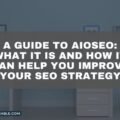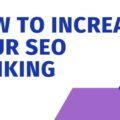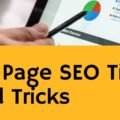Table of Contents
Some links on The Justifiable are affiliate links, meaning we may earn a small commission at no extra cost to you. Read full disclaimer.
Discover the ins and outs of organic SEO in this comprehensive free guide. Learn strategies and tips to improve your website’s visibility and ranking on search engines without paid advertising.
Understanding Organic SEO Fundamentals
Organic SEO refers to the process of improving a website’s visibility on search engine results pages (SERPs) through unpaid methods. By focusing on organic SEO, you can enhance your site’s relevance to search queries, thereby attracting more visitors. This approach requires a deep understanding of search engine algorithms and user behavior.
To truly master organic SEO, it’s essential to incorporate both on-page and off-page strategies. On-page techniques involve optimizing your website’s content and structure, while off-page methods focus on external factors like backlinks. Together, these strategies can significantly improve your site’s search engine rankings and overall online presence.
SEO Services Recommendations
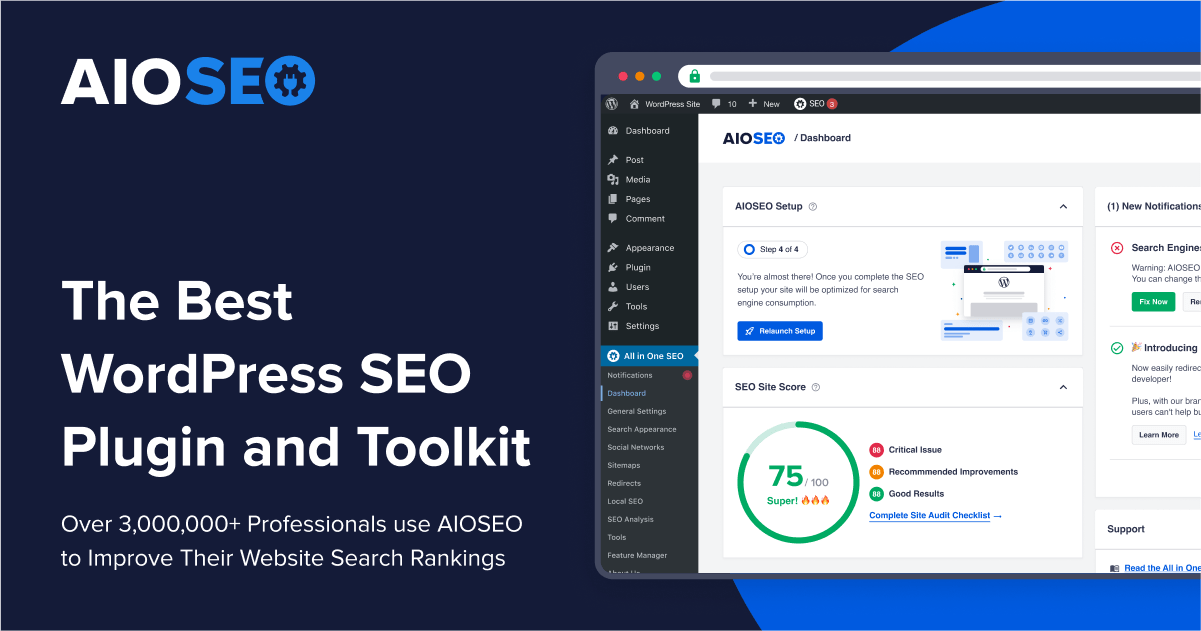 AIOSEO
| 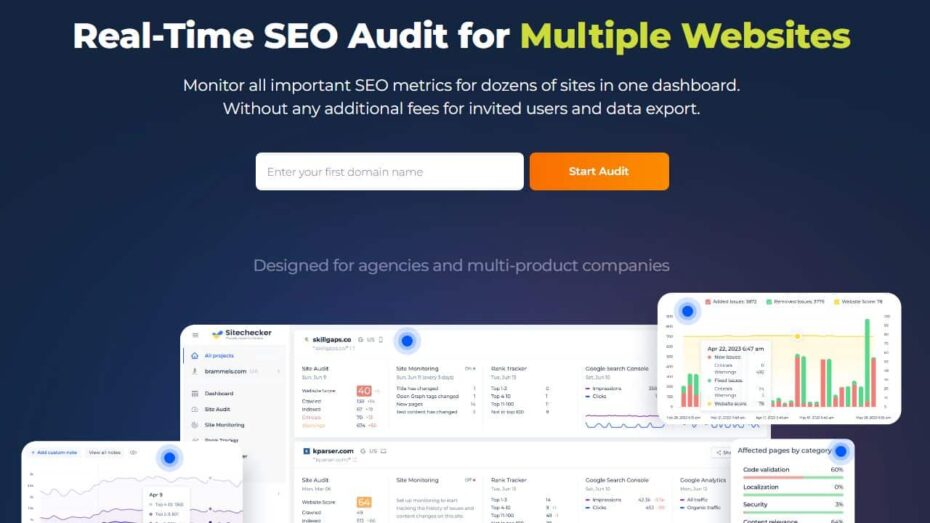 Sitechecker
| 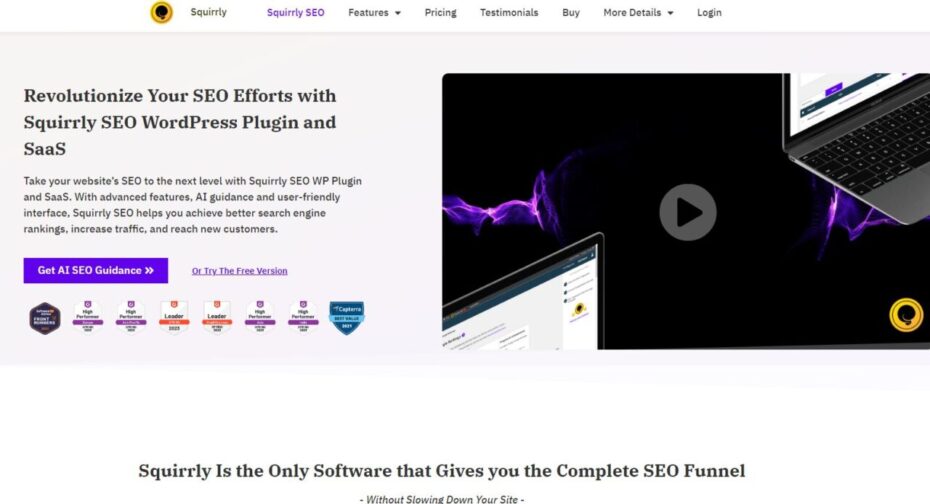 Squirrly
|
Definition of Organic SEO
Organic SEO, or organic search engine optimization, involves optimizing a website to rank higher in search engine results naturally, without paying for advertisements. This process includes a variety of techniques, such as keyword optimization, content creation, and technical SEO improvements. My suggestion is to focus on creating high-quality content that resonates with your audience.
Moreover, I recommend you to ensure your website is technically sound, with fast loading times and mobile-friendly design. This is because search engines prioritize user experience when ranking websites. Additionally, I advise you to regularly update your content to keep it relevant and valuable to your visitors.
Another key aspect of organic SEO is building backlinks from reputable sites. These links act as endorsements, signaling to search engines that your content is trustworthy and authoritative. I strongly believe this is crucial for improving your site’s ranking.
Lastly, I suggest using tools like Google Analytics to track your organic SEO performance. By analyzing data, you can identify areas for improvement and adjust your strategies accordingly. My advice is to continuously refine your approach for the best results.
Importance of Organic SEO for Websites
Organic SEO is vital for websites because it helps improve their visibility in search engine results, leading to increased traffic and potential customers. I point out that this type of SEO is cost-effective compared to paid advertising, providing long-term benefits without ongoing expenses. Furthermore, my recommendation is to invest in organic SEO to build a sustainable online presence.
High-quality organic SEO can establish your website as an authority in your industry. When your site consistently ranks well, users are more likely to trust your brand. I believe this trust translates into higher engagement and conversion rates, ultimately boosting your business growth.
Another benefit of organic SEO is that it targets users who are actively searching for information related to your products or services. This means the traffic you receive is more likely to be interested and engaged. My advice is to focus on understanding your audience’s search intent to tailor your content accordingly.
Finally, organic SEO can improve the overall user experience on your website. By optimizing site structure, load times, and mobile compatibility, you make it easier for users to navigate and find the information they need. I recommend you to prioritize these aspects to enhance both your SEO performance and user satisfaction.
How Organic SEO Differs from Paid SEO
Organic SEO focuses on improving a website’s visibility through natural, unpaid methods. This involves optimizing content, building backlinks, and ensuring technical efficiency. In contrast, paid SEO, or pay-per-click (PPC) advertising, involves paying for ads to appear at the top of search engine results. My advice is to use organic SEO for sustainable growth and long-term results.
I strongly believe that organic SEO is more cost-effective over time. While PPC can deliver quick results, it requires continuous investment. Organic SEO, on the other hand, builds lasting value by enhancing your site’s authority and relevance. I recommend you to integrate both strategies for a balanced approach, leveraging the immediate impact of PPC and the durability of organic SEO.
Organic SEO also enhances user experience by improving site usability and content quality. I suggest focusing on these areas to naturally attract and retain visitors. Paid SEO, although effective for quick visibility, doesn’t contribute to long-term site improvements. I point out that a strong organic SEO foundation is essential for sustained online success.
My advice is to regularly monitor and adjust your SEO strategies based on performance data. This continuous refinement will help you stay competitive. Combining the benefits of organic and paid SEO, while prioritizing organic methods, can yield the best results for your website’s growth and visibility.
Key Components of Organic SEO
Effective organic SEO encompasses several key components. First, content quality is paramount. I recommend you to create informative, engaging, and valuable content that addresses your audience’s needs. High-quality content naturally attracts backlinks and encourages user engagement, both of which are critical for SEO success.
Next, keyword optimization is crucial. I suggest incorporating relevant keywords naturally within your content to improve search engine rankings. However, avoid keyword stuffing, as it can harm your SEO efforts. Focus on long-tail keywords that match user intent to attract more targeted traffic.
Another important aspect is technical SEO. Ensuring your website is technically sound, with fast load times, mobile-friendliness, and secure connections, is essential. I advise you to regularly audit your site for technical issues and fix them promptly to maintain a strong SEO foundation.
Lastly, building high-quality backlinks is vital for organic SEO. I recommend you to earn backlinks from reputable sources, as they signal to search engines that your site is authoritative and trustworthy. Engage in guest blogging, influencer outreach, and content marketing to naturally acquire valuable backlinks and boost your SEO performance.
On-Page SEO Techniques for Better Rankings
On-page SEO is crucial for improving your website’s search engine rankings. By optimizing elements on your site, you can enhance its visibility and attract more organic traffic. My advice is to focus on the key components of on-page SEO, such as meta titles, descriptions, and high-quality content, to achieve better results.
I recommend you to regularly update your website with fresh, relevant content. This not only keeps your audience engaged but also signals to search engines that your site is active and valuable. Additionally, pay attention to technical aspects like site speed and mobile-friendliness to ensure a seamless user experience.
Optimizing Meta Titles and Descriptions
Meta titles and descriptions play a significant role in on-page SEO. I strongly believe that crafting compelling meta titles is essential for attracting clicks from search engine results. Ensure your meta titles are clear, concise, and include the primary keyword naturally to improve relevance.
For meta descriptions, I advise you to write informative and engaging summaries of your content. These descriptions should provide a clear overview and entice users to click on your link. Keep them within the recommended length of 150-160 characters and incorporate your primary keyword naturally to enhance SEO.
I suggest regularly reviewing and updating your meta titles and descriptions to ensure they remain relevant and effective. Analyze their performance using tools like Google Search Console and make adjustments as needed. This ongoing optimization can significantly impact your click-through rates and overall SEO success.
My recommendation is to avoid duplicate meta titles and descriptions across your site. Each page should have unique and specific metadata that accurately reflects its content. This approach not only improves SEO but also enhances the user experience by providing clear and relevant information for each page.
Importance of High-Quality Content
High-quality content is the backbone of effective on-page SEO. I recommend you to focus on creating valuable, informative, and engaging content that addresses the needs of your audience. This not only improves user satisfaction but also increases the likelihood of earning backlinks and social shares.
I believe that consistency in publishing high-quality content is key to building authority in your niche. Regularly update your blog or website with fresh content to keep your audience engaged and attract new visitors. This consistent effort signals to search engines that your site is active and valuable.
My suggestion is to conduct thorough keyword research to identify relevant topics and search terms. Incorporate these keywords naturally within your content to improve its relevance and visibility. However, avoid keyword stuffing, as it can negatively impact the readability and SEO performance of your content.
I advise you to use a variety of content formats, such as articles, videos, infographics, and podcasts, to cater to different audience preferences. Diversifying your content not only keeps your audience engaged but also increases your reach and visibility across different platforms and search engines.
Effective Use of Keywords
Keywords are a crucial component of organic SEO. I recommend you to conduct thorough keyword research to identify terms that your target audience is searching for. Incorporate these keywords naturally within your content, titles, and headings to improve your site’s relevance and ranking on search engines.
My suggestion is to focus on long-tail keywords, which are more specific and less competitive. These keywords often have higher conversion rates as they target users with clear intent. I advise you to avoid keyword stuffing, as it can lead to penalties from search engines and negatively impact user experience.
I strongly believe in using variations of your primary keyword throughout your content. This not only makes your writing more natural but also helps to capture a wider range of search queries. I recommend you to use tools like Google Keyword Planner to find related keywords and phrases.
My advice is to analyze your competitors’ content to identify keyword opportunities you might have missed. By understanding what works well for them, you can refine your own strategy and improve your SEO performance. Regularly update your keyword list based on trends and changes in user behavior.
Improving Website Speed and Performance
Website speed is a critical factor in organic SEO. I point out that a fast-loading site enhances user experience and reduces bounce rates. I advise you to use tools like Google PageSpeed Insights to identify areas for improvement and optimize your website accordingly.
I recommend you to compress images and use efficient coding practices to reduce load times. Large images and bulky code can significantly slow down your site, affecting both user experience and SEO rankings. My suggestion is to implement lazy loading for images and videos to improve performance.
I believe that using a reliable hosting provider can greatly impact your website’s speed. A good host will ensure that your site loads quickly and handles traffic efficiently. I advise you to consider upgrading your hosting plan if you experience frequent slowdowns or outages.
Lastly, I recommend you to enable browser caching and use a content delivery network (CDN) to speed up your website. These techniques help to load your site faster for repeat visitors and distribute your content globally, ensuring a better user experience and improved SEO performance.
Off-Page SEO Strategies to Boost Authority
Off-page SEO is crucial for enhancing your website’s authority and visibility. My recommendation is to focus on building quality backlinks and leveraging social media to boost your SEO efforts. These strategies can significantly impact your site’s search engine rankings and overall online presence.
I believe that effective off-page SEO requires a strategic approach. By engaging with reputable sites and actively participating in social media, you can increase your website’s credibility. This not only improves your rankings but also drives more organic traffic to your site.
Building Quality Backlinks
Building quality backlinks is essential for off-page SEO. I suggest reaching out to authoritative websites in your industry to earn backlinks. These links act as endorsements, signaling to search engines that your content is trustworthy and valuable, which can improve your rankings.
I recommend you to create high-quality content that naturally attracts backlinks. Content such as in-depth articles, infographics, and research studies are more likely to be shared and linked to by other sites. My advice is to focus on creating valuable resources that others find useful.
My suggestion is to engage in guest blogging. By writing articles for reputable websites, you can earn backlinks and reach a broader audience. I advise you to choose sites that are relevant to your niche and have a strong online presence to maximize the benefits of your efforts.
I strongly believe in monitoring your backlink profile regularly. Use tools like Ahrefs or Moz to track your backlinks and ensure they are from reputable sources. Disavow any low-quality or spammy links to protect your site’s integrity and maintain a strong SEO profile.
Leveraging Social Media for SEO
Leveraging social media can significantly enhance your SEO efforts. I recommend you to share your content on platforms like Facebook, Twitter, and LinkedIn to increase visibility and attract more visitors. Social media signals can indirectly impact your search engine rankings.
I believe that engaging with your audience on social media is crucial. Respond to comments, participate in discussions, and share valuable content to build a loyal following. This engagement can lead to more shares and backlinks, boosting your SEO performance.
My advice is to collaborate with influencers in your industry. Influencers have large, engaged audiences and can help amplify your content. I suggest partnering with influencers who align with your brand values and have a strong presence on social media.
Lastly, I recommend you to use social media analytics tools to track your performance. Analyze which types of content get the most engagement and adjust your strategy accordingly. By understanding what works well, you can optimize your social media efforts to support your SEO goals effectively.
Guest Blogging and Influencer Outreach
Guest blogging and influencer outreach are powerful strategies for boosting your organic SEO. I recommend you to write guest posts for reputable blogs in your niche. This not only earns you quality backlinks but also exposes your content to a wider audience, enhancing your site’s authority.
I believe collaborating with influencers can significantly amplify your reach. Influencers have established trust with their audiences, and their endorsements can drive traffic to your site. My advice is to choose influencers whose values align with your brand to ensure authentic partnerships.
When guest blogging, I suggest providing high-value content that resonates with the host blog’s audience. This increases the likelihood of your post being accepted and shared widely. I point out that well-crafted guest posts can lead to long-term relationships with influential bloggers.
I strongly believe in personalizing your outreach efforts. Tailor your pitches to each influencer or blog owner, highlighting how your content can benefit their audience. I advise you to build genuine relationships rather than focusing solely on obtaining backlinks.
Monitoring and Managing Online Reputation
Monitoring and managing your online reputation is crucial for maintaining a positive brand image and effective organic SEO. I advise you to regularly track mentions of your brand across the web. This helps you respond promptly to both positive and negative feedback.
I recommend using tools like Google Alerts and Social Mention to stay updated on what’s being said about your brand. Addressing issues quickly can prevent negative reviews from harming your reputation. My suggestion is to engage positively with your audience to build trust.
My advice is to encourage satisfied customers to leave positive reviews. Positive feedback can improve your brand’s perception and attract more visitors to your site. I believe that actively managing your online reputation enhances your credibility and SEO performance.
I suggest creating a crisis management plan for handling negative publicity. This plan should outline steps for addressing various issues, ensuring a swift and effective response. I point out that a well-managed reputation can significantly impact your organic SEO success.
Technical SEO Best Practices
Technical SEO is vital for ensuring that search engines can effectively crawl and index your site. I recommend focusing on key technical aspects to improve your site’s performance and rankings. By optimizing these elements, you can enhance your site’s visibility and user experience.
Most importantly, I advise you to regularly audit your website for technical issues. This includes checking for mobile-friendliness, ensuring secure connections, and fixing crawl errors. Addressing these issues promptly can significantly boost your organic SEO efforts.
Importance of Mobile-Friendliness
Mobile-friendliness is crucial for technical SEO. I point out that most users access websites via mobile devices, so ensuring your site is mobile-friendly is essential. I recommend using responsive design to provide a seamless experience across all devices, which can improve your rankings.
My suggestion is to test your site’s mobile compatibility using tools like Google’s Mobile-Friendly Test. This will help you identify and fix any issues. I strongly believe that optimizing for mobile users enhances both user experience and SEO performance, driving more organic traffic.
I advise you to focus on mobile page load speed. Faster loading times can reduce bounce rates and improve user engagement. My recommendation is to optimize images and use accelerated mobile pages (AMP) to enhance speed. Mobile optimization is a key component of successful organic SEO.
I suggest monitoring mobile performance regularly. Keep an eye on metrics like load time and user behavior to ensure continuous improvement. By prioritizing mobile-friendliness, you can maintain a competitive edge and enhance your overall SEO strategy.
Structured Data and Schema Markup
Structured data and schema markup are essential for enhancing your site’s search engine visibility. I advise you to implement schema markup to help search engines understand your content better. This can lead to rich snippets, improving your click-through rates and organic SEO.
My recommendation is to use tools like Google’s Structured Data Testing Tool to validate your markup. This ensures it’s correctly implemented and provides the desired results. Structured data can make your site more informative and attractive in search results.
I strongly believe that adding schema markup for reviews, products, and events can significantly enhance your site’s appearance in SERPs. I suggest incorporating relevant schema types to highlight key information. This not only aids search engines but also improves user experience.
I advise you to stay updated with the latest schema types and guidelines. Search engines continually evolve, and keeping your structured data current can maintain your competitive edge. Regularly review and update your schema markup to align with best practices.
Ensuring a Secure Website with HTTPS
Ensuring your website is secure with HTTPS is a fundamental technical SEO practice. I recommend migrating to HTTPS to protect user data and build trust. Most importantly, search engines favor secure sites, so this can positively impact your organic SEO rankings.
I believe using HTTPS can improve your site’s credibility. Users are more likely to trust and engage with secure websites. My advice is to obtain an SSL certificate and ensure all website elements, including images and scripts, are served securely.
I suggest regularly checking your HTTPS implementation for issues. Tools like SSL Labs can help identify and fix any security vulnerabilities. Maintaining a secure site is essential for protecting your users and enhancing your organic SEO performance.
I strongly recommend keeping your SSL certificate up to date. Expired certificates can lead to security warnings and negatively affect your rankings. Regularly renew your SSL certificate and monitor your site’s security status to maintain trust and SEO benefits.
Fixing Crawl Errors and Broken Links
Fixing crawl errors and broken links is critical for maintaining a healthy website. I advise you to use tools like Google Search Console to identify and resolve crawl errors promptly. Ensuring search engines can effectively crawl your site is essential for good organic SEO.
My suggestion is to conduct regular site audits to find and fix broken links. Broken links can harm user experience and SEO. I recommend using tools like Screaming Frog to identify these issues and update or remove broken links to improve site health.
I believe that fixing crawl errors can enhance your site’s indexing. By resolving issues such as 404 errors and server errors, you can ensure search engines can access all your important content. This improves your site’s overall SEO performance.
I advise you to set up proper 301 redirects for removed or moved pages. This ensures that users and search engines are directed to the correct pages, maintaining link equity and user experience. Regularly monitor and manage your site’s crawlability to support your organic SEO strategy.
Measuring and Analyzing SEO Success
Understanding and improving your SEO efforts is crucial for any successful digital marketing strategy. Most importantly, my advice is to regularly measure and analyze your SEO success to ensure your tactics are effective.
Here, I will guide you through using Google Analytics for SEO insights, identifying key metrics to track for organic SEO, exploring tools for SEO analysis and reporting, and making data-driven SEO decisions.
Using Google Analytics for SEO Insights
Google Analytics is an invaluable tool for monitoring your website’s performance and gaining insights into your SEO efforts. I recommend you to set up and configure Google Analytics properly to track various aspects of your site’s traffic. By doing so, you can see how visitors find and interact with your site, which is essential for evaluating your SEO strategy.
My suggestion is to focus on the following key areas in Google Analytics:
- Organic Traffic: Check how much of your traffic comes from organic search. This metric helps you understand the effectiveness of your SEO efforts.
- Landing Pages: Identify which pages are attracting the most organic traffic. I advise you to optimize these high-performing pages to maintain or improve their rankings.
- User Behavior: Analyze metrics like bounce rate, average session duration, and pages per session to see how engaging your content is. High engagement often correlates with good SEO performance.
Key Metrics to Track for Organic SEO
Tracking the right metrics is crucial for understanding your SEO success. I strongly believe the following metrics are essential:
- Organic Search Traffic: This metric shows the number of visitors coming from search engines. A steady increase indicates successful SEO efforts.
- Keyword Rankings: Monitor your rankings for targeted keywords. Improving rankings can lead to increased traffic and visibility.
- Click-Through Rate (CTR): The percentage of users who click on your search engine listings. Higher CTRs suggest your meta titles and descriptions are compelling.
- Conversion Rate: The percentage of visitors who complete a desired action, such as making a purchase or signing up for a newsletter. I advise you to focus on this metric to measure the true impact of your SEO on business goals.
- Backlinks: The number and quality of external sites linking to your content. Backlinks are a significant ranking factor, and increasing them can boost your SEO.
Tools for SEO Analysis and Reporting
Various tools can help you analyze and report on your SEO efforts effectively. My recommendation is to use a combination of tools for comprehensive insights:
- Google Search Console: Offers detailed insights into your website’s search performance, including keyword rankings, click-through rates, and indexing issues.
- SEMrush: Provides a wide range of SEO analytics, from keyword research to competitive analysis and backlink tracking.
- Ahrefs: Known for its robust backlink analysis capabilities, Ahrefs is excellent for understanding your link profile and identifying link-building opportunities.
- Moz: Offers keyword tracking, site audits, and insights into on-page optimization and link building.
Using these tools, I suggest you regularly audit your site and track your SEO progress to stay ahead of the competition.
Making Data-Driven SEO Decisions
Making informed decisions based on data is key to successful SEO. I recommend you to:
- Analyze Trends: Regularly review your metrics to identify trends and patterns. This will help you understand what’s working and what needs adjustment.
- Set Goals: Based on your data, set realistic and achievable SEO goals. Whether it’s improving keyword rankings or increasing organic traffic, having clear objectives is vital.
- Optimize Content: Use data insights to refine your content strategy. Focus on creating high-quality, relevant content that meets the needs of your audience and aligns with your SEO goals.
- Monitor Competitors: Keep an eye on your competitors’ SEO strategies. Tools like SEMrush and Ahrefs can provide valuable insights into their tactics and performance.
Conclusion
Mastering organic SEO requires a blend of technical knowledge and strategic thinking. By implementing these techniques and continuously refining your approach, you can achieve long-term success in search engine rankings.
I’m Juxhin, the voice behind The Justifiable.
I’ve spent 6+ years building blogs, managing affiliate campaigns, and testing the messy world of online business. Here, I cut the fluff and share the strategies that actually move the needle — so you can build income that’s sustainable, not speculative.



